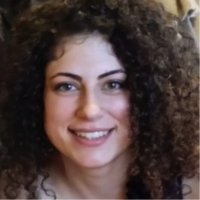Evangelia Panagakou

My background is in Physics (BS, PhD), and Applied Math (MS). I have worked on modeling reaction-diffusion and epidemic systems.
Location Boston, MA, USA
Activity
-
Evangelia Panagakou made a comment
Before this course I didn't know about the hinge point questions. So overall I have learned many things on how students can learn better and what a teacher can do so that he/she understands the students better and help them move forward. I have understood the characteristics that the hinge point questions must have and the difference between them and the other...
-
Evangelia Panagakou made a comment
Q6. I would think that the danger is that the students will get a bit confused with all the possible combinations of answers that they have to check and decide from... I think that this is what happened in this case. There isn't a majority of students that have a specific opinion. The answers are scattered and like this the teacher cannot focus on what is the...
-
Evangelia Panagakou made a comment
...just for a bit. Then I would follow the order of this teacher and in the end I would go again to the students who hadn't talk before to make sure that they are doing something. (Maybe if there was enough time, I would also go once in the middle to these students, if I would think they need it).
-
Evangelia Panagakou made a comment
1. The teacher referred to students previous knowledge, to initiate their thinking about a phenomenon which they were seeing in front of them so that they can develop their thinking on this topic and can build the new knowledge on this basis.
2. The teacher picks up the words light, food, photosynthesis.
3. The relationship between the food and the... -
4th example: The students seem to lack the knowledge on how to compare the mass of the products to the mass of the reactants and they don't know that they need to take into account oxygen in alternating the initial mass. So I would first do an experiment in front of them, measuring the mass of the magnesium before and then the mass of the ashes and then ask...
-
1st example: I understand that the class is not ready to go further. More discussion is needed before such a hinge point question could be answered. So for this case, anyway, I would choose the dialogue and not the hinge point question.
2nd example: I think that the students are not yet ready to separate the cause from the result, that they also need more... -
Evangelia Panagakou made a comment
Currently I am in the US and I am not teaching to K-12, but I am teaching physics to undergraduate pre-meds, so in some sense it is somehow, sometimes, like teaching in US high school.
I understand and realize how useful the hinge point questions are. The way the class I teach is designed, by the Principle Investigator (my supervisor) who is responsible for... -
For me all the points are very important and I would like to be able to apply all of them while teaching. So that I can understand in depth and for all the students, the level of their understanding, thinking, learning, what they expect from me, how further they can go, how i can improve and what i need to change. Also for them to know themselves and their...
-
Evangelia Panagakou made a comment
T4 - It is good that the teacher asked from the students to first make the experiment themselves and then try to find the conclusion. However, the way it goes is a bit confusing for the students in the end. I think the teacher could have discussed a bit in advance what we expect to happen, also refer to possible situations that may occur (like that one bulb...
-
Evangelia Panagakou made a comment
Τ1 - Triggers the imagination of the students. Give the options in his question and the students have to choose and say why. But in the end, they don't show us which answer the teacher will accept and how clear the reasoning will be to all the students.
T2 - It is is nice that the teacher lets the students to "wander" a bit and express their way of thinking.... -
I find particularly interesting these two points of Paul's observations:
1. Ask students such questions so that they have enough time to express their thoughts in sentences and even paragraphs – this process develops their thinking and their expression ability.
2. Show interest about what the pupils think and not if they give a right answer – make them feel... -
Evangelia Panagakou made a comment
AfL helps me structure what students need to learn in a particular lesson. AfL provides me with feedback so that I can plan how to challenge students and move their learning forward. AfL is assessment that happens as learning is taking place so that I can adapt and change what I am doing. And all these happen because of what the sentence one reveals. We can...
-
Evangelia Panagakou made a comment
Currently I am a post doctoral researcher and I teach physics to undergraduate pre-meds. In the past I have also taught to secondary and high school level students.I do not have experience on assessment for learning. I hope that with this MOOC, I will gain some knowledge and experience on assessment for learning and I will be aided towards topics related to...
